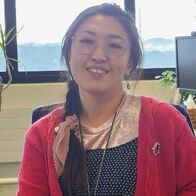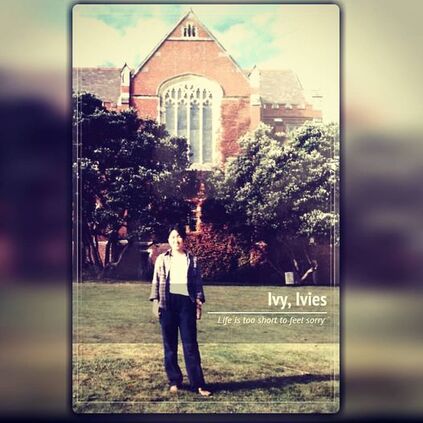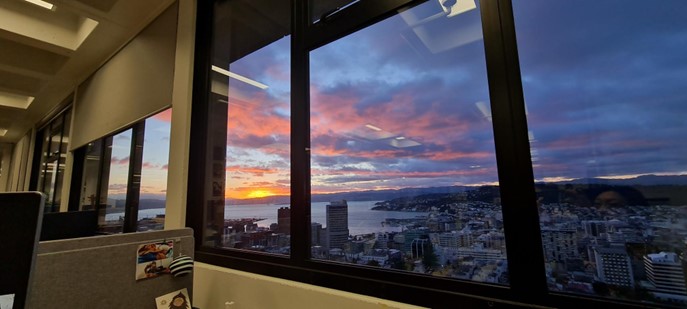Ivy Guo collections manager at Te Herenga Waka Victoria University of Wellington Library

Kia ora koutou and Dajia Hao.
I am Xiaolu (Ivy) Guo. If I must allocate three keywords to describe myself, these are librarian, Chinese, and Wellington.
I grew up in a coastal city in North-East China – Huludao. I was an odd kid growing up and left school as soon as I was allowed. I got my first job as a typist (I know, ha-ha) in a newspaper office when I was 19 years old then found my way to being an editor five years later.
It became clear to me that I wouldn’t make it any further without a degree. Against all advice from friends and relatives, my parents supported me to seek formal education. And that’s when I came to New Zealand in 2002 to study among thousands of international students. When I enrolled in English and media studies at Massey University, I still had the hope that I could go back to the newspaper business. However, I became uncertain as I got closer to the end of my study.
I am Xiaolu (Ivy) Guo. If I must allocate three keywords to describe myself, these are librarian, Chinese, and Wellington.
I grew up in a coastal city in North-East China – Huludao. I was an odd kid growing up and left school as soon as I was allowed. I got my first job as a typist (I know, ha-ha) in a newspaper office when I was 19 years old then found my way to being an editor five years later.
It became clear to me that I wouldn’t make it any further without a degree. Against all advice from friends and relatives, my parents supported me to seek formal education. And that’s when I came to New Zealand in 2002 to study among thousands of international students. When I enrolled in English and media studies at Massey University, I still had the hope that I could go back to the newspaper business. However, I became uncertain as I got closer to the end of my study.
 Nov 2002 – one month after landing in Wellington, a tourist photo in front of Hunter Building.
Nov 2002 – one month after landing in Wellington, a tourist photo in front of Hunter Building.
My library career started with a casual conversation with a tutor before I finished my degree. He used to work at a library and said, ‘Want to be a librarian?’ And I felt like the lightbulb was switched on in my head as soon as the library was mentioned.
Fast forward 16 years, I fell in love with Wellington and managed to hold on to my work at Victoria University Library and my passion for academic libraries. It is an environment that just keeps evolving. The collections are moving further into the digital space, there seems to be a new and better way to search and discover resources every second, the delicate balance between the growing collection and limited space, the open access movement keeps challenging the library and publishing business, etcetera, etcetera.
I have mostly worked in similar areas in the library, not counting a few structural changes, mostly focusing on acquisitions and collection management. After completing the Master of Information Studies, I landed the role of coordinator in the resource and acquisitions team. Then in 2017, I started my current role as the manager.
The team has a wide range of tasks from creating callmark spin labels for physical items, ordering textbooks, and paying invoices for journals, to access troubleshooting and negotiating licenses for some pretty expensive databases. My role is to support them by maintaining a trusted and open environment that allows them to work independently while supporting each other in core tasks.
The other thing I do is manage the library’s collection budget. With the help of my friend Excel, I run expenditure and forecast reports to ensure we stay as close to the budget as we can.
So, on a typical day for me, if I’m not meeting with my team or other colleagues, I would be at my desk either working on a spreadsheet or in the Library Management System to plan project works to tidy up metadata, reconcile acquisition records, or support the team solving difficult cases.
My first LIANZA conference was the 2010 centennial conference. That was definitely one of the reasons I stayed with the profession. Then a few years later, I was one of the lucky ones in the 2016 LIANZA Kōtuku Emerging Leaders programme. Kōtuku gave me the right push at the right time. I have been involved with weekend schools a couple of times since Kōtuku. And since then, I joined LIANZA TEL SIG and LIANZA Te Upoko o te Ika a Māui committees where I get to work with a range of interesting and committed librarians. I am the LIANZA President-elect for 2023-2024.
The opportunities to attend conferences are one of the highlights of my career, particularly the sector conferences such as LIANZA, or ALIA.
I would recommend everyone working in libraries attend at least one library conference every few years. It is an investment with very high returns. Not only the chance to meet the most interesting librarians, publishers, and information specialists to hear from them but it is an opportunity to take a short break from busy day-to-day work and think about the trends, the future, and the possibilities of the library sector.
My advice to graduates is to trust the programme and the skills learned, not just the certificate. You will find the value of studies in your career, sooner or later. It could be the hard skills such as reference or metadata, or soft skills such as analytical and critical thinking, the trends you picked up in articles or case studies you read for assignments, and most definitely the network you built with librarians, professors, and fellow students. Libraries are always on the frontline of changes - technological, social, and economic changes. The study towards a qualification equips us and enables us to face those changes in the future.
I would recommend EdX.org – that's the open online learning platform. I’m a big fan of lifelong learning and went through a few papers with them. Not just work-related ones, but for personal interests too. I enjoyed the self-paced learning method and benefited from the fact that you can try a class or two before committing to the full paper.
I never doubt the value or the future of libraries. With the changes from physical collections to the digital library, from the card catalogue to the discovery system, from the summer classes to online consultations, the means and delivery channels change and will continue to change. But the fundamental functions of libraries remain the same – to engage with our communities, to ensure equitable access to information and technologies, to collect and preserve knowledge and cultural heritage. The list goes on.
In the future library and information services will need more multiskilled library professionals. Libraries will continue to be the center of communities with full recognition from the leaders and our community members. Libraries will continue to be the place where people come to champion the latest technologies, facilitate trending discussions, access and share information, network and socialise with like-minded people. Wait, that’s not future libraries, that’s what we are. Are we living in the future?
Fast forward 16 years, I fell in love with Wellington and managed to hold on to my work at Victoria University Library and my passion for academic libraries. It is an environment that just keeps evolving. The collections are moving further into the digital space, there seems to be a new and better way to search and discover resources every second, the delicate balance between the growing collection and limited space, the open access movement keeps challenging the library and publishing business, etcetera, etcetera.
I have mostly worked in similar areas in the library, not counting a few structural changes, mostly focusing on acquisitions and collection management. After completing the Master of Information Studies, I landed the role of coordinator in the resource and acquisitions team. Then in 2017, I started my current role as the manager.
The team has a wide range of tasks from creating callmark spin labels for physical items, ordering textbooks, and paying invoices for journals, to access troubleshooting and negotiating licenses for some pretty expensive databases. My role is to support them by maintaining a trusted and open environment that allows them to work independently while supporting each other in core tasks.
The other thing I do is manage the library’s collection budget. With the help of my friend Excel, I run expenditure and forecast reports to ensure we stay as close to the budget as we can.
So, on a typical day for me, if I’m not meeting with my team or other colleagues, I would be at my desk either working on a spreadsheet or in the Library Management System to plan project works to tidy up metadata, reconcile acquisition records, or support the team solving difficult cases.
My first LIANZA conference was the 2010 centennial conference. That was definitely one of the reasons I stayed with the profession. Then a few years later, I was one of the lucky ones in the 2016 LIANZA Kōtuku Emerging Leaders programme. Kōtuku gave me the right push at the right time. I have been involved with weekend schools a couple of times since Kōtuku. And since then, I joined LIANZA TEL SIG and LIANZA Te Upoko o te Ika a Māui committees where I get to work with a range of interesting and committed librarians. I am the LIANZA President-elect for 2023-2024.
The opportunities to attend conferences are one of the highlights of my career, particularly the sector conferences such as LIANZA, or ALIA.
I would recommend everyone working in libraries attend at least one library conference every few years. It is an investment with very high returns. Not only the chance to meet the most interesting librarians, publishers, and information specialists to hear from them but it is an opportunity to take a short break from busy day-to-day work and think about the trends, the future, and the possibilities of the library sector.
My advice to graduates is to trust the programme and the skills learned, not just the certificate. You will find the value of studies in your career, sooner or later. It could be the hard skills such as reference or metadata, or soft skills such as analytical and critical thinking, the trends you picked up in articles or case studies you read for assignments, and most definitely the network you built with librarians, professors, and fellow students. Libraries are always on the frontline of changes - technological, social, and economic changes. The study towards a qualification equips us and enables us to face those changes in the future.
I would recommend EdX.org – that's the open online learning platform. I’m a big fan of lifelong learning and went through a few papers with them. Not just work-related ones, but for personal interests too. I enjoyed the self-paced learning method and benefited from the fact that you can try a class or two before committing to the full paper.
I never doubt the value or the future of libraries. With the changes from physical collections to the digital library, from the card catalogue to the discovery system, from the summer classes to online consultations, the means and delivery channels change and will continue to change. But the fundamental functions of libraries remain the same – to engage with our communities, to ensure equitable access to information and technologies, to collect and preserve knowledge and cultural heritage. The list goes on.
In the future library and information services will need more multiskilled library professionals. Libraries will continue to be the center of communities with full recognition from the leaders and our community members. Libraries will continue to be the place where people come to champion the latest technologies, facilitate trending discussions, access and share information, network and socialise with like-minded people. Wait, that’s not future libraries, that’s what we are. Are we living in the future?

